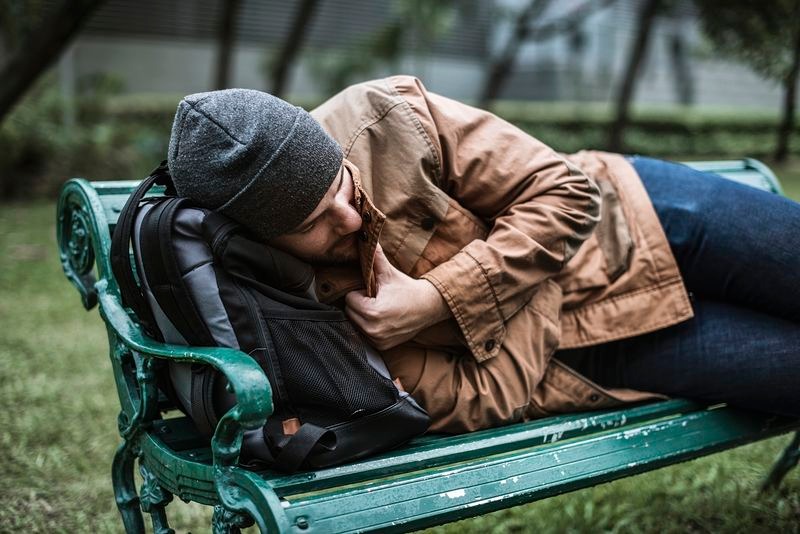Many people may have a common thought process about homelessness. There is a stereotype about the homeless population that says they struggle with substance use disorders.

Substance Abuse in Homeless Populations
How true is this stereotype? Current studies in PubMed and reports by the National Coalition for the Homeless estimate around 30 to 40% of homeless people are dependent on alcohol and 10 to 26% of them abuse other drugs. Contrary to the stereotype, then, the majority of homeless people do not have alcohol or drug addictions.
Those numbers are much greater than the numbers for substance use disorders in the general population. SAMHSA reported that 8.4% of adults in the United States struggled with a substance use disorder in the past year. This shows that substance abuse is a big problem for the homeless population.
Treatment options such as sober living that help individuals who struggle with substance use disorders can make a huge impact and help communities decrease the levels of addiction. In turn, this can decrease the problem of homelessness itself.
Why Homelessness and Substance Abuse Are Linked
Certain factors that make a person more likely to experience homelessness, such as difficult family situations or trauma, also make them more vulnerable to trying drugs or alcohol in an attempt to escape from negative emotions or memories.
Substance abuse itself can lead to homelessness. For example, substance use can be expensive and make it more difficult to maintain regular employment. These factors can lead an individual into financial fluctuations that can leave them homeless.
Substance use may also make an individual’s behaviors change over time. These changes might, in some cases, lead to homelessness, especially if there are other mental health concerns.
Since substance use disorders increase the level of homelessness, treating substance use disorders can help a community decrease homelessness by allowing it to care for its people better and set them up for healthy lives.
How Sober Living Can Help
Those who struggle with substance use may have found themselves homeless as a result of their continued use. Addictions can then make it difficult, if not impossible to climb out of homelessness and begin living a secure life again. After all, substance use disorders decrease a person’s ability to maintain stable employment or be chosen as a tenant.
It is important to understand that breaking the substance use cycle is a difficult challenge on its own. Many individuals who struggle with it and who are homeless find that it is even harder to manage without the proper guidance and support. Fortunately, sober living or sober homes can help.
Sober living provides food, shelter, counseling, and support without the temptation or distraction of substances. They give people a place to break the cycle of addiction and practice living a substance-free life. By addressing substance use disorders, they can help many people conquer the root of their homelessness.
Sober Living and Mental Health
A sober living home is one of the best options for a homeless individual who struggles with substance use. A person in a sober living home will receive a new support network that will allow them to give attention to areas of their life that need it, such as personal development or underlying medical concerns.
In addition, sober living options give individuals the ability to identify mental illnesses and get medical treatment for psychological issues. This will allow them to sustain a healthier lifestyle without unmanaged mental challenges. Since both substance use and mental health disorders can directly cause homelessness, addressing them simultaneously in a sober living home can help decrease the homeless numbers in society.
When individuals struggle with substance use disorders, they often may relapse and find themselves back on the streets. Therefore, sober living homes help them establish routines and habits for being self-dependent and substance-free.
Other Benefits of Sober Living
With stable housing and support, individuals are better able to rebuild their lifestyles free from the negative impacts of homelessness or substance use. Sober living homes provide stability and can strengthen the community while decreasing levels of substance use disorders and homelessness.
Sober living is an excellent way for individuals to do the following:
- find physical healthcare, pursue education
- build a network of reliable relationships
- receive treatments for mental health concerns as well as substance abuse
- engage in events and activities that prolong life
- develop healthier habits
Those who choose a sober living home find themselves having the support and treatment they need while re-engaging with the life they envision for themselves. If an individual is homeless or might be headed towards being homeless, consider a sober living home and find relief today.
Sober Homes Break The Cycle Of Addiction
Sober living homes are a great way to help individuals break the cycle of a substance abuse disorder and focus on building healthier habits. If you or someone you love wants to reestablish stability and begin a substance-free life, consider a sober living home or another form of addiction recovery treatment, such as a drug rehab or addiction center.SoberLivingNearYou.com is the perfect place to find a sober home for your budget, needs, and location. With thousands of sober home listings, you’ll be able to find a sober living home perfectly suited for you. Break the cycle of addiction and start recovery with SoberLivingNearYou.com!



